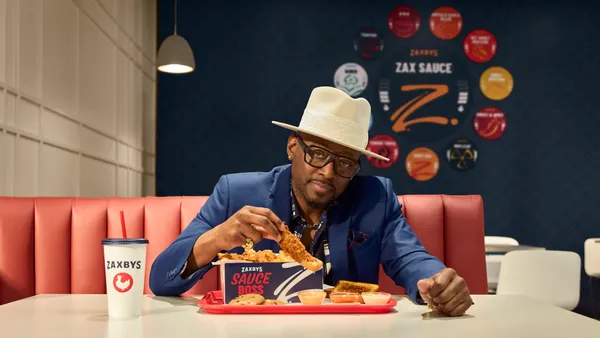A new solution backed by major venture capital firms aims to help businesses better manage their applications of generative artificial intelligence (AI) while addressing brand safety concerns around the emergent technology, according to details shared with Marketing Dive. Typeface, which was founded by former Adobe Chief Technology Officer Abhay Parasnis, has raised $65 million in funding so far. Investors include Lightspeed Venture Partners, GV (formerly Google Ventures), Microsoft’s venture capital fund, M12, and Menlo Ventures.
The core product is a self-service hub for AI-assisted asset creation, letting companies create images and copy for different content formats and then edit the result to their liking and internal workflows. In an example posted on Typeface’s website, a user interested in making an Instagram ad for a pair of sneakers submits a prompt for an image showing the white shoes against an abstract background, with the technology quickly producing multiple options to choose from. A similar process then generates accompanying text for the Instagram post’s caption.
“We are already leveraging Typeface in our brand content development and are inspired by the endless creative possibilities it presents,” said Michele Floriani, chief marketing officer at Sequoia Benefits Group, a firm focused on the HR and benefits space, in a statement. “From ideation to refinement to stress-testing headlines to creating beautiful imagery, Typeface is a powerful solution that will scale our content standards across our organization.”
Other formats available through Typeface include blog posts, creative briefs, emails and product description pages, pointing to a range of applications for marketers. A press release announcing the launch was written with the help of its technology, with AI “responsible for generating entire sentences and paragraphs of text.”
Typeface also allows customers to port over existing assets and catalogs from third-party apps like Google and Facebook to better manage and train their AI. Templates further help control for style and personalization. In another example showcased by Typeface, a new apple juice brand uses a template with a set color palette, target demographic of young consumers, tone of voice (“modern, friendly,” etc.) and values (“simplistic, minimalistic, clean…”) for the AI to follow.
Typeface promises its customers brand safety, including through plagiarism detection and “authenticity checker” features, and that they will have ownership over the content they produce. The idea is to address licensing concerns related to open-source AI tools. Companies interested in the offering can currently join a waitlist.
Marketing Dive has reached out to clarify whether Typeface’s underlying technology is a proprietary AI solution and will update this story pending a response. Ownership has been one of the biggest ethical questions around generative AI, as models are often trained on existing human-made materials scraped from the internet.
Typeface’s debut shows how AI is quickly expanding beyond more experimental bets into the enterprise space. Its backers at the same time speak to rising interest in generative AI in the Big Tech arena. Google and Microsoft are both betting on large language models to evolve their search engines, with the latter working closely in partnership with ChatGPT developer OpenAI.
In related news, Bain & Company and OpenAI last week announced a pact that will see the consultant use the startup’s tools to develop more bespoke digital solutions for clients. Coca-Cola is the first company to take advantage of the alliance, with executives claiming it will “unleash the next generation of creativity.”
Correction: A prior version of this story mischaracterized one of Typeface’s investors. GV is an independent, non-strategic entity backed by Google’s parent company, Alphabet.















